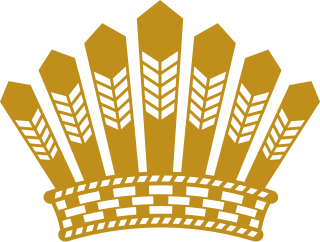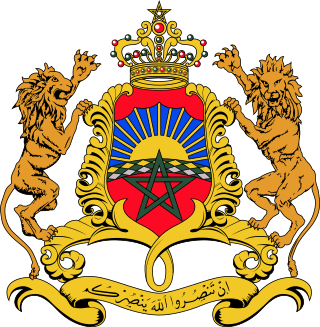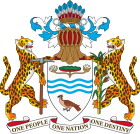
The president of Guyana is the head of state and the head of government of Guyana, as well as the commander-in-chief of the armed forces of the Republic, according to the Constitution of Guyana. The president is also the chancellor of the Orders of Guyana. Concurrent with their constitutional role as Commander-in-Chief of the Armed Forces, the president does not appoint a separate Minister of Defence. That portfolio is held by the president who fulfils all responsibilities designated to a minister of defence under the Defence Act.

Elections in Guyana take place within the framework of a multi-party representative democracy and a presidential system. The National Assembly is directly elected, with the nominee of the party or alliance that receives the most votes becoming President.
A four-part constitutional referendum was held in Ukraine on 16 April 2000. The referendum was called by President Leonid Kuchma, and asked voters whether they approved of four amendments to the constitution that would increase the powers of the President and introduce an upper chamber.

A seven-question referendum was held in Belarus on 24 November 1996. Four questions were put forward by President Alexander Lukashenko on changing the date of the country's independence day, amending the constitution, changing laws on the sale of land and the abolition of the death penalty. The Supreme Council put forward three questions on constitutional amendments by the Communist and Agrarian factions, local elections and the national finances.

A constitutional referendum was held in Russia on 12 December 1993. The new constitution was approved by 58.4% of voters, and came into force on 25 December.

A constitutional referendum was held in France on 21 October 1945. Voters were asked whether they approved of the Assembly elected on the same day serving as a Constituent Assembly, and whether until a new constitution was approved, the country would be governed according to a proposed set of laws that appeared on the ballot paper. If the first proposal had not been approved, the Third Republic would have been restored, but its approval led to the elected Assembly drafting a constitution and proposing it to the people a year later, resulting in the creation of the Fourth Republic. Both were approved by wide margins with a turnout of 79.8%.

A referendum on the method of the election of the president was held in France on 28 October 1962. The question was whether to have the President of the French Republic elected by direct popular vote, rather than by an electoral college. It was approved by 62.3% of voters with a 77.0% turnout. The reform was controversial because it strengthened the executive at the expense of Parliament, and because of the disputed constitutionality of the procedure used.

A constitutional and electoral age referendum was held in Denmark on 28 May 1953. Both proposals were approved by voters, leading to both a new constitution taking effect on 5 June, and the electoral age being lowered from 25 to 23 years, also starting on 5 June. Voter turnout was 59.1% for the constitution question and 57.1% for the voting age question.

A constitutional referendum was held in Denmark on 23 May 1939. Voters were asked whether they approved of a new constitution. Although it was approved by 91.9% of those who voted, a turnout of only 48.9% meant that the percentage of eligible voters approving it was only 44.46%, below the 45% required by the existing constitution of 1915.

A constitutional referendum was held in Spain on Wednesday, 6 December 1978, to gauge support for either the ratification or repealing of the Spanish Constitution which had been approved by the Cortes Generales on 31 October 1978. The question asked was "Do you approve of the Constitution Bill?". The referendum resulted in 92% of valid votes in support of the bill on a turnout of 67%.

The Constitution of Guyana is the highest governing document in the Republic of Guyana. It came into effect on October 6, 1980, replacing the constitution enacted in 1966 upon its independence from the United Kingdom. The current Constitution of Guyana contains 12 chapters that are further divided into 232 articles. It also contains a preamble and an oath. Since its 1980 enactment, it has gone through multiple amendments.
A referendum on political reform was held in Spain on Wednesday, 15 December 1976, to gauge support for either the ratification or repealing of the Political Reform Act which had been approved by the Cortes Españolas on 18 November 1976. The question asked was "Do you approve of the Political Reform Bill?". The referendum resulted in 97.4% of valid votes in support of the bill on a turnout of 77.7%.

A nationwide referendum was held in Moldova on 5 September 2010 on whether or not the country should amend the Constitution of Moldova to return to direct popular election of the president. Since 2001, the president had been indirectly elected by Parliament, with a supermajority of 61 seats required for election. The voters are asked to answer the following question: "Would you agree with the Constitutional amendment, which would allow the election of the President of the Republic of Moldova by the entire population?" Voters chose one of the proposed options: "Yes (for)" or "No (against)". Of those who had cast their vote, 87.83% chose "Yes". However, the referendum did not pass because only 30.29% of voters turned out, short of the necessary 33% for the referendum to be considered valid.

A constitutional referendum was held in Morocco on 1 March 1972. The new constitution replaced that approved by referendum in 1970, and was drawn up after an attempted coup in July 1971 forced King Hassan II to accept the need for a broader government.

A constitutional referendum was held in Morocco on 30 May 1980. The referendum asked voters if they approved of changes to articles 43 and 95 of the 1972 constitution, which would extend the term of Parliament from four to six years and the term of the president of the House of Representatives from one to three years. The changes were approved by 97% of voters, with a 91% turnout.

A constitutional referendum was held in Morocco on 13 September 1996. The new constitution created a bicameral Parliament by adding the Assembly of Councillors to the existing Assembly of Representatives. The 270-seat Assembly of Councillors would be indirectly elected by local councillors, chambers of commerce (81), and trade unions (27), whilst the 325-seat Assembly of Representatives would now be entirely directly elected. The changes were approved by 99.5% of voters, with an 85% turnout. Fresh elections were held the following year.

A constitutional referendum was held in Poland on 25 May 1997. Voters were asked whether they approved of a new constitution. It was narrowly approved, with 53% voting in favour. Voter turnout was 43%, below the 50% required by the 1995 Referendum Act to validate the referendum. However, the Supreme Court ruled on 15 July that the 1992 'small' constitution took precedence over the Referendum Act and that the constitution could be introduced.

A constitutional referendum was held in Bangladesh on 15 September 1991. Voters were asked "Should or not the President assent to the Constitution Bill, 1991 of the People's Republic of Bangladesh?" The amendments would lead to the reintroduction of parliamentary government, with the President becoming the constitutional head of state, but the Prime Minister the executive head. It also abolished the position of vice-president and would see the President elected by Parliament.

A referendum on the length of the term of Parliament was held in New Zealand on 23 September 1967. Voters were asked whether they approved of extending the term from three to four years. The change was rejected by 68.1% of voters, with a turnout of 69.7%.
A referendum is a direct vote in which an entire electorate is asked to either accept or reject a particular proposal. This article summarises referendum laws and practice in various countries.












